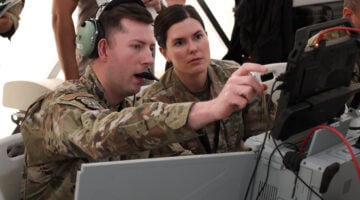
BEIRUT — As war continues to rage in Ukraine and Turkey appears less and less attached to the Russian-made S-400 air defense system, a high-profile industry official reportedly claimed recently that Ankara didn’t “need” the system anyway because it’ll soon be overshadowed by locally produced tech.
It’s a boast that experts told Breaking Defense was perhaps premature, but grounded in the reality that Turkey has made significant progress in its domestic air defense industry, from operational short-range systems to long-range systems in the later stages of production, giving Ankara a certain amount of freedom from Moscow and Turkish industry a boost in the region.
“Air defense systems have been one of the top priority areas in local defense industry programs,” Middle East defense expert and researcher Arda Mevlütoğlu told Breaking Defense. “Turkey so far has developed and put into service several air defense early warning radar and command-control systems, such as ERALP long-range air defense radar, AIR low-altitude air defense radar, HERIKKS air defense command and control system, as well as Korkut self-propelled air defense gun system, Sungur MANPADS, Hisar family of low- and medium-altitude air defense missile systems and lately, the Siper long-range air defense missile system.”
RELATED: Frustration mounts for Israeli defense firms that can’t export payloads for drones
Development of tech like that last one, Siper, is likely what prompted Haluk Gorgun, chairman of Turkish defense firm Aselsan Elektronik Sanayi, to say earlier this month that Ankara need no longer rely on the Russian systems.
“We are making air defense systems. We don’t need S-300s, S-400s,” he told a local news outlet. “We are eliminating the need for them. This is our duty.”
Changing Geopolitical Landscape
As Breaking Defense has previously reported, Turkey appears less likely to accept a second batch of S-400s from Moscow, despite Russian claims to the contrary.
When Turkey agreed in 2017 to purchase the first system over Washington’s protests, Ankara was more worried about stability in the wake of the failed July 2016 coup attempt, gaining a strategic advantage for potential military action in northern Syria and generally easing tensions with Moscow, experts said.
“[The] S-400, they were led to believe, would provide the protection they sought. Additionally, Turkish leadership felt an immediate need to establish an A2/AD (anti-access/area denial) bubble over northern Syria, within which, it was hoped, Turkish military would gain the freedom action irrespective of the meddling and objections of the U.S. and other actors,” military and security studies analyst and associate professor at Izmir University of Economics in Turkey, Sitki Egeli told Breaking Defense.
But since, Syrian President Bashar Assad has consolidated power, and Russia’s invasion of Ukraine has drastically redefined the geopolitical and diplomatic landscape.
“The war in Ukraine reminded Ankara of the Russian threat, as well as the value of its membership in NATO,” Egeli said. “With Assad regime in full control, the scenery in Syria is totally different. And the Erdogan regime came to realize that policies shaped around isolation and military assertiveness do not pay off.”
Thus, Egeli said, “Efforts have been underway to mend Turkey’s international relations. In such political, diplomatic and setting, a follow-on order for additional S-400s does not sit anywhere.”
There’s also the question, he said, of the S-400’s effectiveness in the wake of a successful Ukrainian aerial attack on Russian facilities reportedly guarded by the system. “We now know the effect and effectiveness of S-400 was greatly overblown. But at the time of procurement, the widely held perception and analyses was to the contrary,” Egeli said.
Missile Defense Systems At Home And Abroad
As it drifts from the Russian system, Turkey has been implementing an ambitious plan to locally produce its own missile defense systems. Experts said the short- and medium-range systems have come a long way, and some are operational, though long range air defense systems with capabilities similar to S-400 are still in the testing phase.
Siper, which can hit targets 60 miles out and has been compared to the S-400, for instance, carried out a successful test firing in August. Turkish media said the system is expected to enter service at the end of 2023, though Egeli suggested it would “probably” take a few more years to field and validate the system’s effectiveness.
Egeli said the long-range defenses have taken longer than their short-range brothers in part just due to their complexity. He highlighted that the crux of the matter are the software algorithms computing and updating the precise meeting point over great distances between a maneuvering target and the interceptor travelling at great speeds.
“This is all a matter of lengthy trial and error process that would take up lots of actual test firings and simulations,” he concluded.
Michael Tanchum, non-resident fellow at the Middle East Institute, said likewise that “Turkey’s air defense gap lies with the defense against missiles and not winged aircraft.”
So, in addition to locally made systems, Tanchum said Ankara’s “primary goal” has been to find “an appropriate foreign partner for joint development for a long-range air defense system to counter possible ballistic missile threats.”
American Patriots were a consideration before Turkey’s first batch of S-400s went into operation, but Egeli said more recently the European-made SAMP/T was a contender.
It had been offered to the Turks before the S-400 deal was made, and a provisional agreement was signed years ago, but talks had stalled until March 2022 when Turkish President Recep Tayyip Erdogan spoke with French and Italian leaders about the joint project at a NATO conference.
“We signed an agreement, a letter of intention with [European manufacturer] Eurosam like eight years ago, [but] nothing happened until today. Now those two countries are most curious to have joint production in Türkiye to export SAMP/T, the air defence system, to my country,” Turkish Foreign Minister Mevlut Cavusoglu told CNBC at the time.
What about Turkey’s export ambitions?
With active short-range systems and long-range systems expected to come online in coming years, experts told Breaking Defense Turkey is continuing an aggressive push in the defense market in the region.
“Turkey is actively promoting all its air defense systems. There has been an export of the Hakim air defense command and control system to Azerbaijan and the missile component of the Hisar system to Indonesia under the TriSula program,” Mevlütoğlu said.
From his side Egeli said that since the inception of its ambitious defense industry development program in mid-1980s, Turkey has not hidden its intention and aspiration to use defense exports as a means to lighten the burden on its national economy’s major investments in defense sector.
“Without any exceptions, any defense product to have been developed in Turkey has also been actively promoted and marketed abroad. I don’t see a reason why this won’t be the case for air defense systems. As witnessed in the case of Turkish-made drones, any willing buyer with financial means would be in the list of potential buyers,” he added.
For exports, Mevlütoğlu pointed out that Turkey has the upper hand to NATO countries, as it offers NATO-standard equipment and systems with minimum, if any, political conditions and strings attached.
“Furthermore, almost all of the products and systems of the Turkish defense industry are combat proven in several conflicts and operations. The Siper is still under development and currently is not a direct competitor with the S-400, but in the very near future, it may very well be a feasible alternative,” he commented.
Exports, too, have been greatly affected by the war in Ukraine – beyond the explosion of interest in its drones, according to Tanchum.
“Russia’s invasion of Ukraine and Europe’s strong and united response in support of Kyiv was geopolitical game-changer for Turkey’s defense export markets,” he said. “The map of Turkey’s recent and prospective drone sales in Europe shows that the commercial interests of Turkey’s weapons industry is tilting Anakara away from Moscow.”

